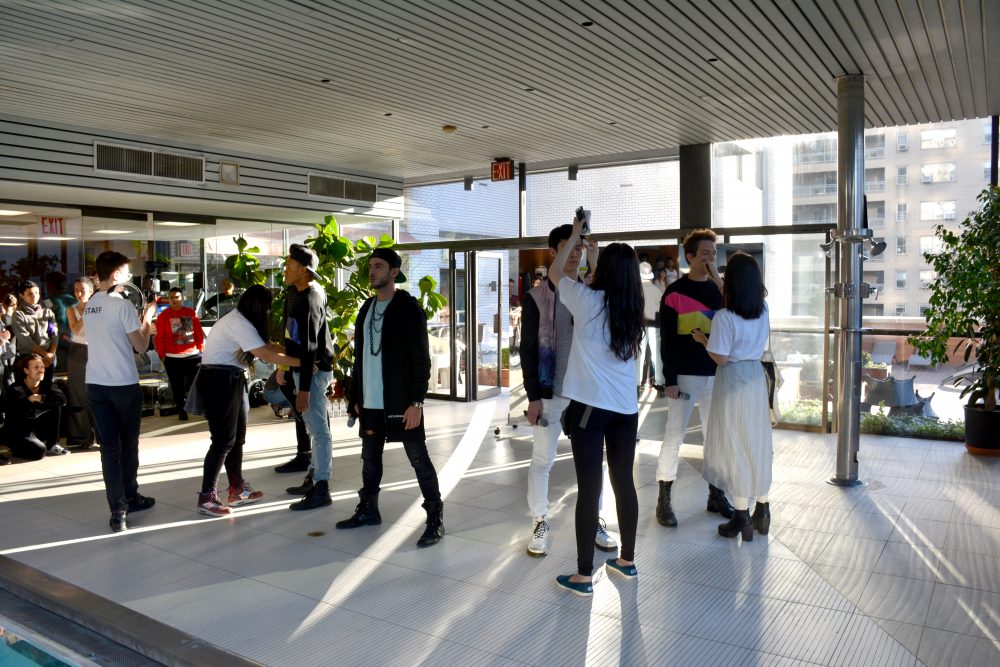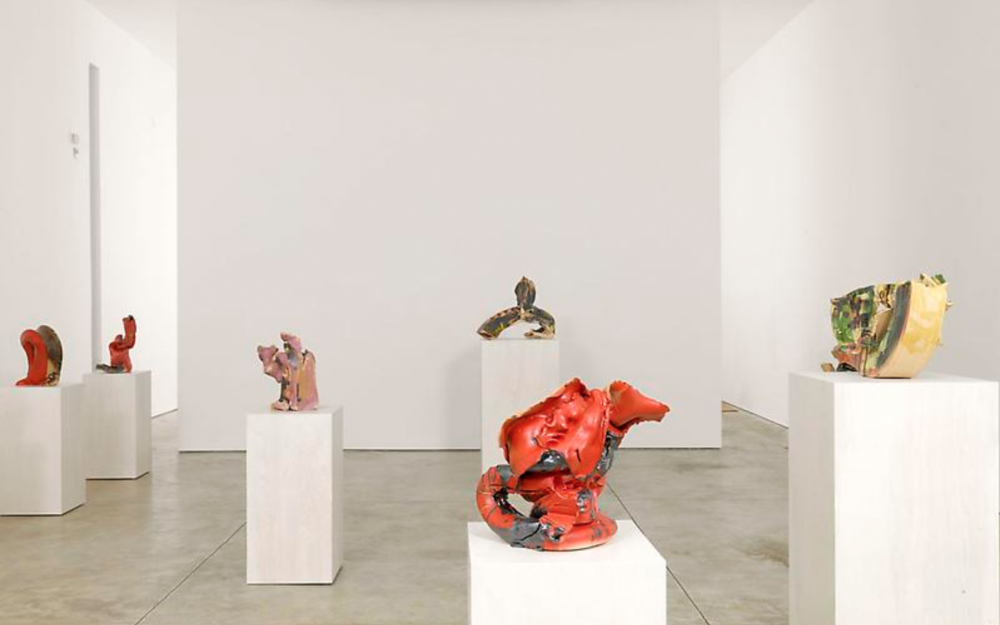Going Global: EXP and I’m Making a Boy Band
Curator Lynnette Miranda writes on the rise of the band EXP and challenging what K-pop is and can be.

K-pop band EXP. Photo by Jhe Ming Hsu. Courtesy I’m Making a Boy Band.
i·dol (n.)
1. an image or representation of a god used as an object of worship.
2. a person or thing that is greatly admired, loved, or revered.
Making an idol is hard work. Becoming an idol is even tougher. In Korean pop, often abbreviated as K-pop, an idol is a celebrity entertainer that has gone through years of rigorous training from a corporate entertainment agency. Trainees audition for a coveted spot in the agency’s program. After signing long-term contracts, they move onto the agency’s campus to master their singing, dancing, acting, and language skills with the express purpose of one day being chosen to be part of a K-pop idol group. Many trainees begin this process as adolescents, and only after several years of training will the very best become idols.
In October 2014, artists and cultural producers Bora Kim, Karin Kuroda, and Samantha Y. Shao embarked on a daunting enterprise—to make the first New York K-pop group. Avoiding the cynicism and irony of much contemporary art, they were determined to create a real K-pop group, rather than illustrating one for the sake of parody. Under the project name I’m Making a Boy Band (IMMABB), they conceived and produced EXP, an all-male K-pop group including five charismatic, non-Korean band members: Hunter, Šime, Frankie, Koki, and Tarion. Situated within contemporary art, IMMABB explicitly blurs the lines between art and popular culture to raise critical questions about identity, representation, and culture.
K-pop emerged in South Korea in the early 1990s, and within a decade it had spread across Asia, the Middle East, North Africa, Latin America, Eastern and Central Europe, and so on. Unlike genres that are characterized solely by their musical qualities, K-pop synthesizes audio, video, dance, and fashion into a singular style. It visually and sonically blends pop, hip-hop, R&B, and EDM, taking a postmodern approach to culture-making. In the last decade, South Korea has become a major exporter of popular culture, developing a multibillion-dollar industry. The Korean Wave, or Hallyu, is the term commonly used to describe the global dissemination of Korean popular culture, including K-pop and Korean television dramas (K-drama). Its economic impact is even recognized by the government, which, through its Ministry of Culture, Sports and Tourism, promotes K-pop domestically and abroad. According to IMMABB’s Bora Kim, “the Korean government has found that for every $100 made in K-pop exports, there’s a profit increase of $400 in Korean IT-product sales, for example, things like mobile phones.”
EXP’s music video for “LUV/WRONG,” 2015.
The women of IMMABB model the production and management of EXP after the male-run agencies that manufacture idol groups in Korea, such as YG Entertainment and S.M. Entertainment. After a series of auditions in New York in fall 2014, EXP’s members were chosen and asked to sign contracts confirming their full participation. The members are required to regularly participate in dance classes, Korean language lessons, and cuteness workshops, and even to collaborate on songwriting. Their commitment includes performances, press appearances, and interviews. This level of intensity makes it clear that EXP is not a ruse; the five bandmates are actually in a K-pop band. EXP officially debuted on April 26, 2015, performing their first single “LUV/WRONG” at Columbia University’s MFA thesis exhibition, where Kim was a graduate candidate.
Leading up to their public debut, EXP’s social-media accounts were bombarded with messages of confusion, anger, and hate from K-pop fans around the world. Fans of the popular group EXO accused EXP of being copycats. But the reactions at large unveiled a core question: Can EXP even be considered a K-pop group if they’re not Korean? In their comments, listeners mocked the group and wrote in protest that EXP weren’t “even Asian.” But the most jarring comments were about the band’s two African-American members (David, the band’s original sixth member has since left); some fans rejected the idea of black K-Pop idols altogether and others questioned the animosity. Comments on YouTube, Instagram, and other forums ranged from “Someone should burn them alive” to “I don’t see how they think this will work. Do they not know what Koreans think of foreigners?” On Instagram, @exp3ctati0n comments, “Ew. no. please no...what is this…stop, ew. Black people aren’t meant for make-up…just stay black & white, stop acting like Asians.” Immediately following, @j1nn7 responds, “Why so much hate?” The question of whether K-pop bands should include non-Korean members (some already do)—and more specifically non-Asian members—highlights the crafted identity of K-pop idols and the role of nationalism in the genre’s global appeal.
From 1910 until 1945, Korea was colonized by the Japanese, and after the Second World War, South Korea was officially under U.S. occupation until 1948. The U.S. backed South Korea during the Korean War (1950-1953), which left the peninsula demolished and impoverished. Through various Five-Year Plans for economic development, beginning in the 1960s, South Korea transitioned to a successful export-oriented economy, maintaining close economic ties with the U.S. and Japan, and it is now one of the richest and most technologically advanced countries in the world. The country’s complex sociopolitical history, its progressive economic strategies, and its present-day commitment to popular culture play a central role in the development of Korea’s postcolonial identity.

EXP preparing to perform at CompleteBody 57 in New York in “Oceans Breathe Salty,” curated by Mette Woller. Photo by Søren Aagaard. Courtesy I’m Making a Boy Band.
Japan and the U.S. maintain firm economic and political ties to South Korea. Since the Korean War, a strong U.S. military presence remains in the country, with nearly 30,000 soldiers stationed in Seoul in 2014. It is no surprise that pop culture imported from these countries, such as J-pop and hip-hop, heavily influences K-pop, making it difficult to pinpoint explicitly Korean formal characteristics, aside from language. Instead, its Koreanness is communicated through the nuanced yet constructed narratives of perfection and fantasy. This notion of perfection is also reflected in the fact that South Korea has the highest rate of plastic surgery in the world. In K-pop, idols are expected and trained to be innocent, humble, gracious, and hard-working. They are deliberately single. These wholesome values make K-pop stars approachable, relatable, desirable, and saleable to domestic and global audiences alike. K-pop songs are often composed with a few phrases in English, and in some cases songs are completely translated into other languages such as Japanese and Mandarin, providing another form of access across national borders.
The Korean government, which officially invests in K-pop, utilizes it to strengthen its global image and expand its economic power, particularly in developing countries, where they believe youth will be more likely to purchase Samsung products in the future. While the Korean government uses K-pop as an instrument for soft power, IMMABB employs it to complicate notions of representation and identity in our globalized society. One catchy song at a time, EXP is quickly infiltrating the K-pop world, forcing its fans to participate in conversations about cultural authenticity and appropriation. Fans agree, disagree, and change their minds on social media and on online forums. More broadly, the project highlights the power and reach of popular culture. IMMABB have constructed this hybrid project outside the limits of the white cube and beyond the one-dimensionality of the entertainment industry. Instead, it takes advantage of both the accessibility and mass appeal of pop culture and the critical dialogue of contemporary art.
Since their debut, EXP has released two singles and a music video, and they are currently working on a mini-album EXPeriment, set to be released later this year. They have regularly performed in art contexts including at the Jewish Museum, the Queens Museum Gala, and the Aperture Spring Party and Dinner. In early 2016, the group was featured on KBS, South Korea’s national public broadcaster, in addition to getting coverage from American and Korean online media outlets, such as the Huffington Post Korea, Vice, The Fader, the Korea Times, and the Washington Post. EXP has rattled the K-pop world in its debut year, but its journey toward success continues. While they have received recognition as an art project, building a solid fan base is paramount for their success as a K-pop group, and that will be no small feat. EXP’s current mission: to perform in the global capital of Korean Pop—Seoul. #NOSLEEPTILLKOREA



